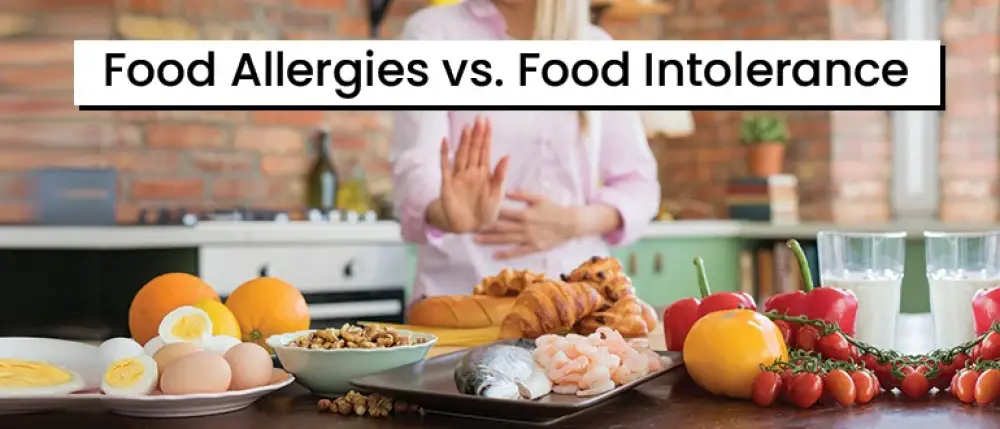Reactions to certain foods are often mistakenly thought to be a food allergy, when in fact, it is food intolerance that causes similar symptoms as a food allergy. It is important to understand what causes food allergies and. food Intolerance. Understanding the difference helps in modifying diet and managing the symptoms.
In this article you’ll get to know the meaning of food allergy and food intolerance, the difference between food allergy and food intolerance along with their causes, symptoms and ways to prevent them. Let’s begin!
What is the Difference between Food Allergy and Food Intolerance?
Talking about intolerance vs allergy, both are the body’s reaction to a foreign substance, but both have different causes and symptoms.
What is Food Allergy?
A food allergy happens when your immune system identifies a threat or an allergen and produces antibodies as a defence against the threat. These antibodies cause an allergic reaction in which defensive chemicals called histamines are released causing symptoms of allergy.
Symptoms of Food Allergy
The common symptoms of food allergy include:
- Hives
- Body rashes
- Vomiting
- Trouble in breathing
- Tightness in throat
- Drop in blood pressure
- Stomach pain
- Coughing, etc.
Causes of Food Allergy
The main cause of a food allergy is the overreaction of the immune system in response to allergens. These allergic reactions can be serious and life-threatening. Eating even a small amount of allergy-causing food can trigger Anaphylaxis, which is a serious allergic reaction. Anaphylaxis may have all of the above-mentioned symptoms and requires immediate medical attention as it can lead to unconsciousness.
What is Food Intolerance?
Food intolerance happens when you are not able to digest certain foods or some foods irritate your digestive system. In food intolerance, people can consume small amounts of food without any problem.
Symptoms of Food Intolerance
Food intolerance is not as severe as a food allergy, but it also has symptoms related to digestive issues, such as:
- Gas
- Bloating
- Constipation
- Diarrhoea
- Stomach ache
- Nausea
- Headaches
- Fatigue, etc.
Causes of Food Intolerance
The most common cause of food intolerance is lack of certain digestive enzymes which make it difficult to break down certain foods. The other causes of food intolerance can be sensitivity to additives in food and reaction to certain chemicals naturally present in the food. However, food sensitivity is different from food intolerance.
>> Also Read: Avoid These 6 Skin Allergies This Summer: Helpful Tips and Tricks
Dairy Sensitivity vs Lactose Intolerance
Lactose intolerance is often considered the same as dairy sensitivity, but this is not the case. Here are the differences between the two:
- Lactose intolerance refers to the inability to digest lactose present in milk or other dairy products because your body does not produce enough lactase (digestive enzyme). As a result, you have digestive issues when you consume dairy products. However, dairy sensitivity means an immune response to milk proteins, where your immune system releases histamines in response to milk proteins.
- Symptoms of lactose intolerance and dairy sensitivity are similar. The difference lies in the time when symptoms appear. In case of sensitivity, symptoms may or may not appear immediately after consuming dairy products. Sometimes, symptoms appear after a few days, making it difficult to diagnose the root cause. In lactose intolerance, symptoms appear immediately.
Food Allergy vs Food Sensitivity
Though people may use them interchangeably, Food allergy and food sensitivity are different. However, both are the response to a foreign invader by producing antibodies. The table below explains food sensitivity vs allergy.
| Food Sensitivity | Food Allergy | |
|---|---|---|
|
Antibodies Produced |
IgG Antibodies |
IgE Antibodies |
|
Onset |
Slow reaction; hence symptoms appear late |
Fast reaction; hence symptoms appear immediately |
|
Effect |
Severe but not life-threatening |
Severe and life-threatening |
|
Symptoms |
Joint Pain Stomach ache Rashes Brain fog Digestive issues Fatigue |
Difficulty in breathing Low blood pressure Hives Swelling in face Tightness in throat |
|
Trigger Foods |
Gluten-containing food Foods rich in histamines Fructose-rich foods Food preservatives FODMAP food (food containing a specific carbohydrate that the body cannot absorb properly) |
Fish Peanuts Soybean Wheat Milk Eggs Tree nuts |
What is the Treatment for Food Allergy and Food Intolerance?
When it comes to treatment, a food intolerance is the same as a food allergy because both conditions have no specific treatment. The only way to deal with them is to manage the symptoms and completely avoid the foods that trigger them. In case of a severe allergic reaction, your doctor may prescribe antihistamine medication or an auto-injection device for allergies, depending on the severity of your symptoms. People with food allergies should always carry their allergy medication or injections in case of a reaction, as it can be life-threatening if not addressed immediately. Additionally, they should always be cautious and check ingredients before consuming any food to prevent an allergic reaction.
In Conclusion
If your symptoms after consuming certain foods are disrupting your daily life and becoming more frequent, it is time to consult an allergist to identify the root cause of the problem. Once you identify the root cause, it is best to avoid triggers and take prescribed medication. Also, lifestyle changes should be made if necessary to lead a healthy, allergy-free life.
Also, don’t forget to insure your family against unexpected medical emergencies by investing in a suitable health insurance plan from a Care Health Insurance. With our comprehensive family health insurance plan, you'll have access to 11,500+ cashless network hospitals and 21700 cashless healthcare providers to avail cashless facility.
Disclaimers: All plan features, benefits, coverage, and claims underwriting are subject to policy terms and conditions. Kindly refer to the brochure, sales prospectus, and policy documents carefully.
